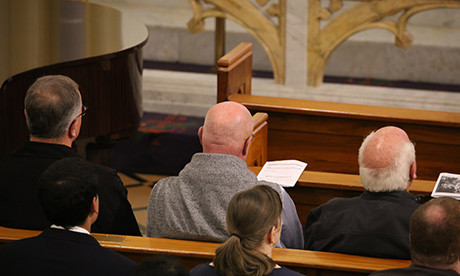Why pray? Let me suggest the first reason: God wants to be in a relationship with you.
How can you know this? Because you want to pray. And how do I know that? Because you’re reading this.
That may sound sarcastic, but it’s not.
There’s a serious point here: your desire for prayer reveals something about how God created you.
Deep within you is a natural desire to communicate with God, to share yourself with God, to have God hear your voice, or, more basically, to encounter God.
Deep within you is a longing to be in a relationship with God. So you long to pray.
You may doubt many things when it comes to prayer.
You may doubt that you’ll be able to pray.
You may doubt that God wants to communicate with you.
You may even doubt God’s existence. But you cannot doubt that you feel a desire for prayer. After all, you’re reading this. So clearly something within you desires prayer.
Where does the desire for prayer come from?
From God.
The most common way God draws you closer is by placing within you the desire to be closer, the desire that drove you to think about prayer and to read this article.
Strange as it sounds, your reading of these lines at this moment is a sign of God’s call.
How else would God draw us closer, other than by planting a longing inside us?
Once I saw a ceramic plaque in a retreat house that summed this up: “That which you seek is causing you to seek.”
This insight is helpful to those beginning their journey of prayer because it helps them feel, even before they’ve started to pray, connected to God. It helps them to know that God has taken the initiative, that God is calling to them, that God desires them. It helps people take the first tentative steps toward God.
Many of us have felt that there is more to life than what we know.
We feel a sense of incompletion. We long to feel complete, to be connected, to be satisfied, to know. Inside us are nagging feelings of longing, restlessness, and incompletion that can be fulfilled only in a relationship with God.
There is a hole in our hearts that only God can fill.
Augustine put it best when he wrote: “You have made us for yourself, O Lord. And our hearts are restless until they rest in you.”
Your desire to pray is a sign that God desires you.
It’s an indication God is calling you. And that is perhaps the most important reason to pray.
Not simply because you desire it, but because the desire is a sign of something else.
You desire to pray because God desires it.
A second reason for prayer is a slight reframing of this.
We pray because we want to be in relationship to God.
That may sound obvious – of course we pray to be closer to God. But it’s important to state that the aim of prayer is not simply physical relaxation, mindfulness, knowledge, or a connection to creation, as important as those things are.
These are goals that many people mention when speaking about meditation.
But the goal of prayer is closer union with God.
More basically, we pray because we love God. William Barry SJ writes: “The primary motive for prayer is love, first the love of God for us and then the arousal of our love for God.”
We pray to come to know God as well. “Who is God?” is an important question in the spiritual life. So are “Who is God for me?” and “Who am I before God?”
Prayer reminds us of our need for God.
It reminds us that we are not the centre of the universe and that we are not God.
Sometimes when things are going well, we can grow arrogant and complacent in our self-sufficiency.
Prayer, which places us in the presence of God in an intentional way, reminds us of who is in charge, or rather who is nurturing us. Gerard W. Hughes writes in God of Surprises: “To begin prayer it is sufficient to acknowledge that I am not self-sufficient, that I am not the creator of myself and creation. If I can do this, then I acknowledge that there is some power – I may not know whether it is personal or not and may be in complete ignorance of its nature – greater than I.” Continue reading
Additional readingNews category: Analysis and Comment.




